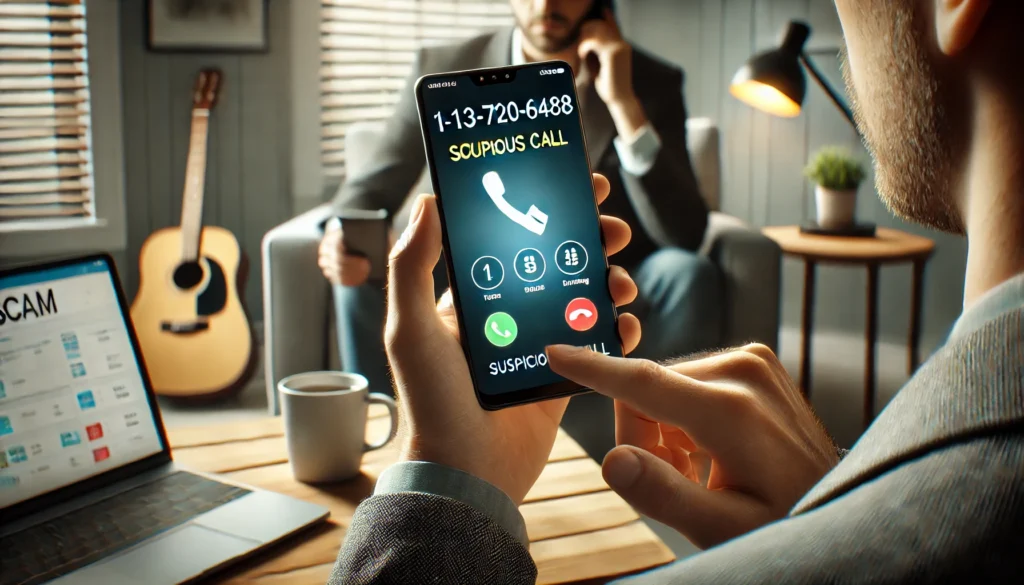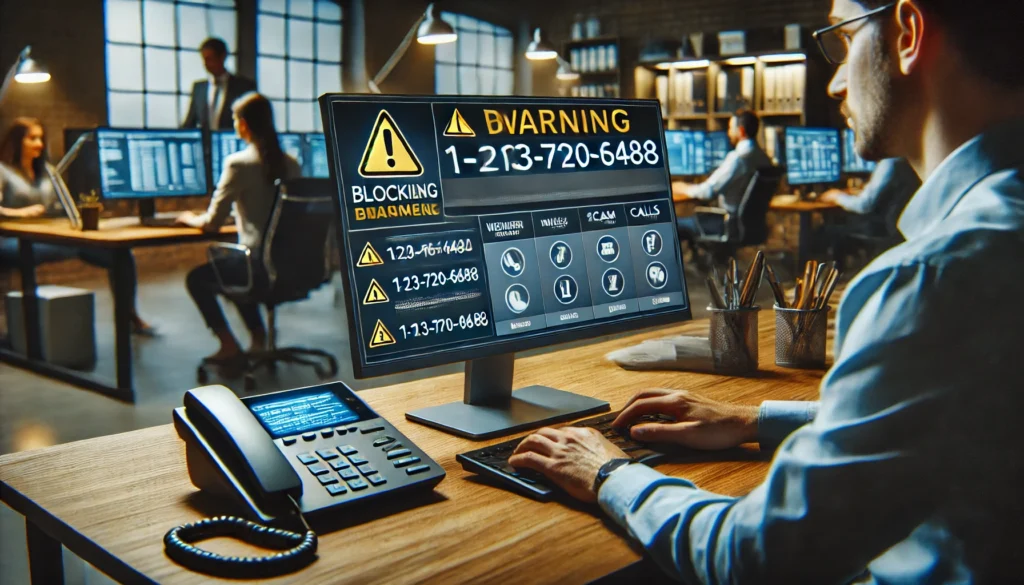Introduction: Why You’re Getting Calls from 1-213-720-6488
If you have received a call from 1-213-720-6488, you’re not alone. Many people report receiving calls from this number, often experiencing silent calls, automated messages, or scam attempts. But is this number actually a scam, or could it be a legitimate call? In this guide, we will explore everything about 1-213-720-6488, including common scam tactics, how to identify fraudulent calls, ways to block and report them, and how to protect yourself from phone scams in the future.
1-213-720-6488: Quick Facts
| Detail | Information |
| Phone Number | 1-213-720-6488 |
| Area Code | 213 (Los Angeles, CA) |
| Call Type | Likely Spam/Scam Call |
| Reported Issues | Silent calls, robocalls, scam attempts |
| Common Complaints | Fake IRS calls, banking fraud, tech support scams |
| Legitimacy | No known legitimate business uses |
Is 1-213-720-6488 a Scam or Legitimate Number?
When people receive unknown calls, they often wonder whether it’s a scam or a legitimate contact. Reports suggest that 1-213-720-6488 is mostly associated with scam activities, as many users have complained about fraud attempts. Some characteristics of these scam calls include automated voice messages, demands for personal or financial information, and threats of legal action.
How to Identify a Scam Call from 1-213-720-6488?
- Unsolicited Calls – If you did not expect a call from this number, be cautious.
- Pre-Recorded Messages – Many scams use automated messages instead of a live person.
- Requests for Personal Information – No legitimate caller will ask for your Social Security number, bank details, or passwords.
- Urgent or Threatening Language – Scammers often create a sense of urgency to trick victims.
- Caller Spoofing – Sometimes, scammers manipulate caller IDs to make the number appear real.
Common Scams Associated with 1-213-720-6488
Scammers use different tactics to trick people. Some of the most commonly reported scams from 1-213-720-6488 include:
1. IRS or Government Impersonation Scams
Scammers pretend to be from the IRS or other government agencies, claiming you owe back taxes and must pay immediately to avoid arrest.
2. Bank & Financial Fraud Calls
You may receive a call stating that there has been suspicious activity in your bank account. The scammer will ask for your details to “verify” your identity.
3. Fake Tech Support Scams
A scammer may claim they are from Microsoft or Apple, stating that your device has a virus and needs remote access to fix the issue.
4. Lottery & Prize-Winning Scams
These calls tell you that you have won a large prize but must pay fees or taxes upfront to claim it.
5. Debt Collection & Loan Forgiveness Scams
Scammers claim you have outstanding debts and must make immediate payments to avoid legal action.
How to Protect Yourself from Spam & Scam Calls
- Do not answer unknown numbers – If you don’t recognize the number, let it go to voicemail.
- Never share personal information – Legitimate organizations will not ask for sensitive details over the phone.
- Hang up immediately – If the caller pressures you to act fast, it’s a red flag.
- Verify the caller – If they claim to be from a legitimate company, hang up and call back using the company’s official number.
- Use call-blocking apps – Services like Truecaller, Hiya, and Nomorobo can help filter scam calls.
How to Block 1-213-720-6488 on Your Phone
For iPhone Users:
- Open the Phone app.
- Find the number in the recent calls list.
- Tap the info button (i) and select “Block this Caller.”
For Android Users:
- Open the Phone app.
- Tap the number and select “Block/Report Spam.”
How to Report 1-213-720-6488 as a Scam Number
If you receive a fraudulent call from this number, you can report it to authorities:
- FTC (Federal Trade Commission) – Report scams at www.ftc.gov
- FCC (Federal Communications Commission) – File complaints at www.fcc.gov
- Better Business Bureau (BBB) – Report scams through www.bbb.org
The Rise of Robocalls: Why Spam Calls Keep Increasing
Scam calls are increasing due to advancements in robocall technology. Scammers use auto-dialers to target millions of numbers daily. They obtain phone numbers through leaked databases, online forms, and social media profiles. Efforts like the STIR/SHAKEN framework aim to reduce spam calls, but scammers continue to find new loopholes.
FAQs (Frequently Asked Questions)
1. Can a scam call infect my phone with malware?
No, simply receiving a scam call cannot infect your phone with malware. However, if you follow instructions to download an app or visit a malicious website provided by the scammer, your device could become compromised. Always avoid clicking on suspicious links sent via text or email from unknown numbers.
2. What happens if I call back a suspected scam number like 1-213-720-6488?
Calling back a scam number can confirm to scammers that your phone line is active, increasing the likelihood of receiving more spam calls. In some cases, scammers may use premium-rate numbers that charge high fees per minute. It is best to avoid calling back unknown numbers.
3. Can I sue a scammer who keeps calling me?
Yes, under laws like the Telephone Consumer Protection Act (TCPA) and Do Not Call Registry rules, you may have legal grounds to sue repeat scam callers, especially if they violate regulations. Some consumers have successfully filed lawsuits and received compensation for harassment by robocallers.
4. Why do scam calls often appear to come from local numbers?
Scammers use caller ID spoofing to disguise their real number and make it seem like the call is coming from a local area code. This tactic increases the chances of the recipient answering the call. Even though 1-213-720-6488 is linked to Los Angeles, the caller may not actually be in that location.
5. How can I educate others about phone scams and protect my family?
To protect family and friends from scam calls, share safety tips such as:
- Never answering unknown calls.
- Using call-blocking apps.
- Reporting suspicious numbers to authorities.
- Setting up scam call warnings on smartphones.
Educating elderly relatives is especially important since they are common targets for scammers.
Conclusion
If you receive a call from 1-213-720-6488, remain cautious. Based on user reports, this number is frequently linked to scam activities. Protect yourself by avoiding unknown calls, blocking numbers, and reporting scams to authorities. Stay informed, use call-blocking services, and never share personal information over the phone. By staying vigilant, you can minimize the risk of falling victim to phone scams and ensure your personal and financial safety.
Recommended Articles
Comprehensive Guide to MS5040940: Understanding and Fixing Exchange Server Vulnerabilities
Köszönöm a Névnapi Kívánságokat Lap: A Comprehensive Guide
Richard Lin Ballantyne Rotary Club: A Comprehensive Guide
Ultimate Guide to Replacing the Motor for Black & Decker 40V Hedge Trimmer 90576
Taramali Takalim Karikatur: A Comprehensive Guide to Understanding This Unique Art Form



